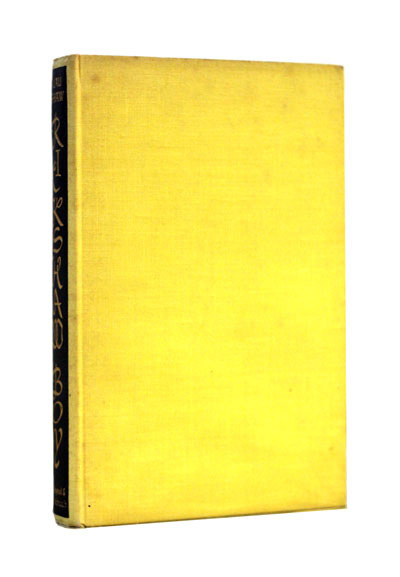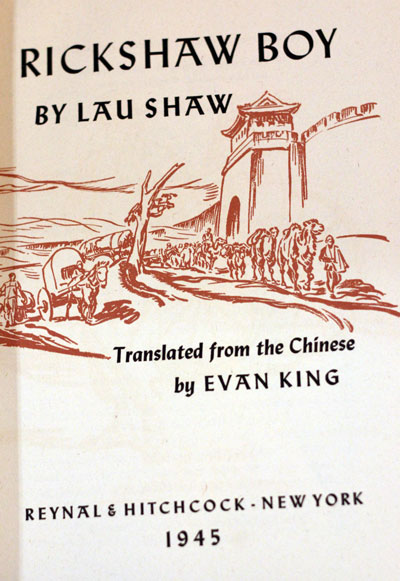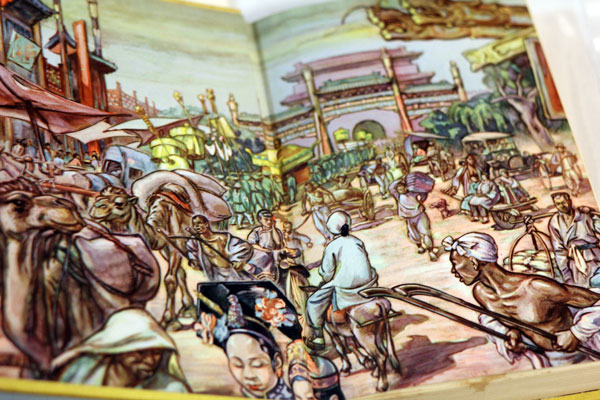About the book (from wikipedia):
Rickshaw Boy or Camel Xiangzi (Chinese: 骆驼祥子; pinyin: Luòtuo Xiángzi; literally: “Camel Auspicious Lad”) is a novel by the Chinese author Lao She about the life of a fictional Beijing rickshaw man. It is considered a classic of 20th-century Chinese literature.
Plot:
Set in the 1920s, the novel’s protagonist is an orphan peasant who leaves for Beijing to earn a living. Xiangzi is a young, hardworking, well-built rickshaw puller who dreams of owning his own rickshaw. Just when he has earned enough to buy one, it is confiscated by warlord soldiers. By a twist of fate he comes across some camels during his escape from the military, which he later sells, earning the nickname Camel. However, the cash Xiangzi obtains from this is not enough for him to buy another new rickshaw – providence decrees that he must toil once more. A police secret agent later extorts him into paying him his savings, leaving Xiangzi impoverished again. Left with no choice, Xiangzi returns to work for Old Master Liu, the boss of a thriving rickshaw rental company.
Although he tries to be honest and down to earth, Xiangzi finds himself entangled between Old Master Liu and his stout, manipulative daughter Tiger Girl, ten years his senior. Tiger Girl, who is carrying a torch for him, insists on marrying Xiangzi after pretending to be made pregnant by him. Her father disowns her and the couple live together, progressively made poor by her spendthrift ways. Later, Tiger Girl becomes pregnant by Xiangzi and grows even fatter as she awaits her delivery due her laziness and greediness for food.
When Tiger Girl dies during childbirth and Xiangzi’s infant child is stillborn, Xiangzi is distraught. He later finds meaning in life again in a female neighbour, the meek and long-suffering Little Fuzi, who is forced into prostitution by her idle father. When Xiangzi has earned enough to redeem her from the brothel, he is devastated to find she has committed suicide.
The harsh realities of life taught Xiangzi that decency and hard work have little meaning in this pragmatic, dog-eat-dog world. He becomes a lazy, degenerate and unscrupulous good-for-nothing, no different from those he looked down on early in his life, spending his days gambling, cheating and whoring.
Background and author:
The characterization or point of view in Rickshaw Boy reflects the influence of Russian literature in China in general, and particularly on the way that influence was transferred to China by Lu Xun in stories such as The True Story of Ah Q and “Diary of a Madman”.
The subject matter of Rickshaw Boy aligned with concerns of Chinese leftists and the Chinese Communist Party. For instance, the final sentences read, “Handsome, ambitious, dreamer of fine dreams, selfish, individualistic sturdy, great Hsiang Tzu. No one knows how many funerals he marched in, and no one knows when or where he was able to get himself buried, that degenerate, selfish, unlucky offspring of society’s diseased womb, a ghost caught in Individualism’s blind alley.”
Lao She went on to play a leading role in literary associations endorsed by the government, such as the All-China Federation of Literature and Art. According to the introductory section of the Foreign Languages Press (Beijing) English translation, “Before Liberation [Lao She] wrote many works of literature, including his best novel Camel Xiangzi (or Rickshaw Boy) to expose and denounce the old society.
While he now enjoys prestige in China and was named a “People’s Artist” and “Great Master of Language”, at the beginning of the cultural revolution he was severely persecuted. The Red Guards paraded him through the streets and beat him in public. Being humiliated both mentally and physically, he, according to the official record, committed suicide by drowning himself in Beijing’s Taiping Lake in 1966.




